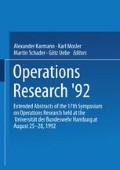Abstract
This paper treats Scheduling models that can be described by considering in sequence the resources, tasks systems, sequencing constraints and performance measures. The conditions Flow-shop means that the tasks of each job should be processing sequentially, there is one machine for each task, a job is processed using one machine at a time without preemption and a machine process exactly one job at a time. The condition No-wait means that delays between tasks of the same job are not allowed. In this particular case, Flow-shop No-wait, the schedule is determined by a sequence of jobs. The Stochastic hypothesis is that: the processing times of the job i on machine j are random, according to some continuous and independent distribution functions T ij and with the realizations known only during the shop. The Objective is to minimize the expected value of the makespan, where the makespan, cmax, is the total amount of time required to completely process all the jobs [Coffman 1976, Ferreira 1990, Frostig 1985].
Access this chapter
Tax calculation will be finalised at checkout
Purchases are for personal use only
References
Bruno, J. L & Downey, P. J. (1986). Probabilistic bounds on the performance on list scheduling. SIAM 1. Comput. 15(2): 409–417.
Coffman Jr, E.G. (1976). Computer and lob-Shop Scheduling Theory. New York, John Wiley.
Ferreira, U. (1990). Stochastic Scheduling Flow-shop No-wait Problems. ITA, São José dos Campos, SP, 1990. Tese de Doutorado.
Frostig, E. & Adiri, I. (1985). Stochastic flow shop no-wait scheduling. J. Appl. Prob. 22: 240–246.
Goldberg, D. (1989). Genetic Algorithms in Search. Optimization and Machine Learning. Addison-Wesley.
Hertz J.; Krogh, A & Palmer, R G. (1991). Introduction to the Theory of Neural Computation. Addison Wesley.
Holland, J. H. (1973). Genetic algorithms and the optimal allocation of trials. SIAM Journal of Computing 2(2): 88–105.
Igelmund, G. & Radermacher, F. J. (1983). Algorithmic approaches to preselective strategies for stochastic scheduling problems, Network, 13: 29–48.
Rock, H. (1984). The three — machine no — wait flow shop is NP-Complete. Journal of the Assodation for Computing Machine, 31(2): 336–345.
Author information
Authors and Affiliations
Editor information
Editors and Affiliations
Rights and permissions
Copyright information
© 1993 Springer-Verlag Berlin Heidelberg
About this paper
Cite this paper
Ferreira, U.R. (1993). -Stochastic Scheduling Flow-Shop No-Wait with Heuristics Using Artificial Intelligence Techniques. In: Karmann, A., Mosler, K., Schader, M., Uebe, G. (eds) Operations Research ’92. Physica, Heidelberg. https://doi.org/10.1007/978-3-662-12629-5_33
Download citation
DOI: https://doi.org/10.1007/978-3-662-12629-5_33
Publisher Name: Physica, Heidelberg
Print ISBN: 978-3-7908-0679-3
Online ISBN: 978-3-662-12629-5
eBook Packages: Springer Book Archive

